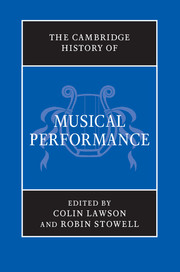Book contents
- Frontmatter
- PART I PERFORMANCE THROUGH HISTORY
- 1 Performance today
- 2 Political process, social structure and musical performance in Europe since 1450
- 3 The evidence
- 4 The performer and the composer
- 5 The teaching of performance
- 6 Music and musical performance: histories in disjunction?
- PART II PRE-RENAISSANCE PERFORMANCE
- PART III PERFORMANCE IN THE RENAISSANCE (C. 1430–1600)
- PART IV PERFORMANCE IN THE SEVENTEENTH CENTURY
- PART V PERFORMANCE IN THE ‘LONG EIGHTEENTH CENTURY’
- PART VI PERFORMANCE IN THE NINETEENTH CENTURY
- PART VII THE TWENTIETH CENTURY AND BEYOND
- PART VIII
- Index
6 - Music and musical performance: histories in disjunction?
from PART I - PERFORMANCE THROUGH HISTORY
Published online by Cambridge University Press: 28 March 2012
- Frontmatter
- PART I PERFORMANCE THROUGH HISTORY
- 1 Performance today
- 2 Political process, social structure and musical performance in Europe since 1450
- 3 The evidence
- 4 The performer and the composer
- 5 The teaching of performance
- 6 Music and musical performance: histories in disjunction?
- PART II PRE-RENAISSANCE PERFORMANCE
- PART III PERFORMANCE IN THE RENAISSANCE (C. 1430–1600)
- PART IV PERFORMANCE IN THE SEVENTEENTH CENTURY
- PART V PERFORMANCE IN THE ‘LONG EIGHTEENTH CENTURY’
- PART VI PERFORMANCE IN THE NINETEENTH CENTURY
- PART VII THE TWENTIETH CENTURY AND BEYOND
- PART VIII
- Index
Summary
If you love music, hear it; go to operas, concerts and pay fiddlers to play to you; but I insist upon your neither piping nor fiddling yourself. It puts a gentleman in a very frivolous, contemptible light . . . Few things would mortify me more, than to see you bearing a part in a concert, with a fiddle under your chin, or a pipe in your mouth.
The Earl of Chesterfield's precept signals the disjuncture between the concepts of music and musical performance as perceived by a British aristocrat in the mid-eighteenth century: listening to music is something a nobleman might do and enjoy without compromise to his station in life, but to participate in its performance is to invite social stigma. And Adam Smith could observe that to work as a professional performer was a ‘sort of public prostitution’, and the ‘exorbitant rewards’ paid to the most admired players and opera singers both reflected the rarity and beauty of their talents, and compensated them for the social ‘discredit of employing them in this manner’. But Smith's prediction that any lessening in society's prejudice against performers would lead to a corresponding diminution of their earning potential was to prove very wide of the mark; it stands now as an indication of just how much the routine disparagement of performers and an accompanying ambivalence towards music's cultural standing was to change. For not only was nineteenth-century Britain to prove one of the most lucrative earning grounds for superstar performers, but as a nation it also became serious about encouraging and training its own native performing talent, so as to be the better able to satisfy its appetite for music of all kinds.
- Type
- Chapter
- Information
- The Cambridge History of Musical Performance , pp. 169 - 206Publisher: Cambridge University PressPrint publication year: 2012

